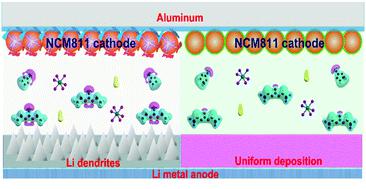当前位置:
X-MOL 学术
›
Energy Environ. Sci.
›
论文详情
Our official English website, www.x-mol.net, welcomes your feedback! (Note: you will need to create a separate account there.)
A nonflammable electrolyte for ultrahigh-voltage (4.8 V-class) Li||NCM811 cells with a wide temperature range of 100 °C
Energy & Environmental Science ( IF 32.5 ) Pub Date : 2022-04-21 , DOI: 10.1039/d1ee02959b Peitao Xiao 1, 2 , Yun Zhao 3 , Zhihong Piao 1 , Baohua Li 3 , Guangmin Zhou 1 , Hui-Ming Cheng 1, 4, 5
Energy & Environmental Science ( IF 32.5 ) Pub Date : 2022-04-21 , DOI: 10.1039/d1ee02959b Peitao Xiao 1, 2 , Yun Zhao 3 , Zhihong Piao 1 , Baohua Li 3 , Guangmin Zhou 1 , Hui-Ming Cheng 1, 4, 5
Affiliation

|
The development of ultrahigh-voltage lithium metal batteries is one of the most promising ways to increase the energy density. However, commercial ethylene carbonate (EC)-based electrolytes have poor compatibility with both lithium metal anodes and cathodes at ultrahigh voltages. We report a high-voltage resistant electrolyte (HV electrolyte) produced by the fluorination of commercial solvents with the guidance of theoretical calculations. These designed solvents, with low energy levels of the lowest unoccupied molecular orbital (LUMO), can be preferably reduced at the lithium metal anode, suppressing lithium dendrite growth because of the formation of a LiF-rich solid–electrolyte interphase (SEI). Fluorination also decreases the energy levels of the highest occupied molecular orbital (HOMO), resulting in improved anodic stability at ultrahigh voltages. The low binding energies between fluorinated solvents in the HV electrolyte and Li+ accelerate the desolvation of Li+, leading to excellent electrochemical kinetics. As a result, Li||LiNi0.8Co0.1Mn0.1O2 (NCM811) cells, which can work in a wide operating temperature range from −30 to 70 °C, have capacity retentions of 95.1% after 160 cycles and 85.7% after 100 cycles at ultrahigh cut-off voltages of 4.7 and 4.8 V, respectively. Li||NCM811 cells with a thin (50 μm) lithium metal anode and a lean electrolyte were constructed, and had a capacity retention of 89.2% after 150 cycles, demonstrating high potential in practical use as high energy density batteries.
中文翻译:

用于超高压(4.8 V 级)Li||NCM811 电池的不可燃电解质,温度范围为 100 °C
开发超高压锂金属电池是提高能量密度最有希望的途径之一。然而,商用碳酸亚乙酯(EC)基电解质在超高电压下与锂金属阳极和阴极的相容性较差。我们报告了在理论计算的指导下通过氟化商业溶剂生产的耐高压电解质(HV 电解质)。这些设计的溶剂具有最低未占分子轨道 (LUMO) 的低能级,可以在锂金属阳极处被优选地还原,由于形成富含 LiF 的固体电解质界面 (SEI),从而抑制了锂枝晶的生长。氟化还降低了最高占据分子轨道(HOMO)的能级,从而提高了在超高电压下的阳极稳定性。HV 电解质中的氟化溶剂与 Li 之间的低结合能+加速 Li +的去溶剂化,产生优异的电化学动力学。因此,Li||LiNi 0.8 Co 0.1 Mn 0.1 O 2 (NCM811) 电池可在 -30 至 70 °C 的宽工作温度范围内工作,160 次循环后容量保持率为 95.1%,循环后容量保持率为 85.7%。分别在 4.7 和 4.8 V 的超高截止电压下进行 100 次循环。Li||NCM811 电池采用薄 (50 μm) 锂金属负极和贫电解液构建,在 150 次循环后容量保持率为 89.2%,在高能量密度电池的实际应用中具有很高的潜力。
更新日期:2022-04-21
中文翻译:

用于超高压(4.8 V 级)Li||NCM811 电池的不可燃电解质,温度范围为 100 °C
开发超高压锂金属电池是提高能量密度最有希望的途径之一。然而,商用碳酸亚乙酯(EC)基电解质在超高电压下与锂金属阳极和阴极的相容性较差。我们报告了在理论计算的指导下通过氟化商业溶剂生产的耐高压电解质(HV 电解质)。这些设计的溶剂具有最低未占分子轨道 (LUMO) 的低能级,可以在锂金属阳极处被优选地还原,由于形成富含 LiF 的固体电解质界面 (SEI),从而抑制了锂枝晶的生长。氟化还降低了最高占据分子轨道(HOMO)的能级,从而提高了在超高电压下的阳极稳定性。HV 电解质中的氟化溶剂与 Li 之间的低结合能+加速 Li +的去溶剂化,产生优异的电化学动力学。因此,Li||LiNi 0.8 Co 0.1 Mn 0.1 O 2 (NCM811) 电池可在 -30 至 70 °C 的宽工作温度范围内工作,160 次循环后容量保持率为 95.1%,循环后容量保持率为 85.7%。分别在 4.7 和 4.8 V 的超高截止电压下进行 100 次循环。Li||NCM811 电池采用薄 (50 μm) 锂金属负极和贫电解液构建,在 150 次循环后容量保持率为 89.2%,在高能量密度电池的实际应用中具有很高的潜力。



























 京公网安备 11010802027423号
京公网安备 11010802027423号